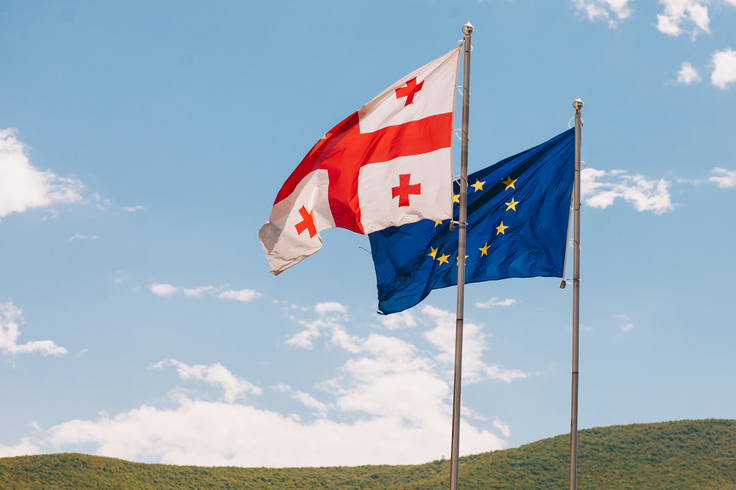September 2014 saw the signing of the so-called Deep and Comprehensive Free Trade Agreement (DCFTA) between the European Union (EU) and Georgia. Two years later the agreement entered into effect, enabling both partners to trade within the scope of the specified conditions. The aim is for the Georgian economy to gradually become integrated into that of Europe, also achieving a higher degree of welfare in Georgia. The effects that this free trade agreement could have on agricultural and food products, their trading and the living standards of the Georgian population are analysed by IAMO Visiting Research Fellow Prof. Dr. Dr. h.c. mult. Ulrich Koester in the current IAMO Policy Brief.
The EU is willing to accept further countries as members. However, as the applicant countries tend not to fulfil all the criteria for EU membership at the time of applying, the EU offers the funding of adaptation aid. For example, the EU has concluded an association agreement with Georgia, Moldavia and Ukraine in order to facilitate and accelerate the necessary adaptation to the criteria of EU membership.
The objectives of the association agreement with Georgia are detailed in article 1, paragraph 2. The first objective stated is: “to promote political association and economic integration between the Parties based on common values and close links, including by increasing Georgia's participation in EU policies, programmes and agencies.” The agreement aims to deliver comprehensive EU assistance far beyond a normal trade agreement. For the Georgian agricultural sector and those that work in it, numbering approximately 50 percent of people in paid employment, the free trade agreement has raised great hopes. The intention is to enable the free movement of goods between the EU and Georgia. As the EU import restrictions for agricultural goods are significantly higher than for commercial products, an increase in Georgian farm produce exports could result in considerable welfare effects for the Georgian population.
In his analysis, the agricultural economist Ulrich Koester comes to the conclusion that the direct welfare effects will be limited. There are three reasons for this: (1.) The EU tariffs are partly redundant, as the EU is already an exporter for some agricultural products and the domestic prices are therefore largely determined by the prices on the global market. (2.) The EU has already concluded most favoured nation agreements with numerous countries and thereby reduced the potential import gap. (3.) Overall, Georgia is a major net importer of agricultural products. Agricultural products are primarily exported to Eastern Europe in unprocessed form. Georgia will therefore initially only be able to export such products to the EU that are currently exported to other countries. In addition, however, products for which Georgia has no import requirement can also be exported to the EU, as the tariff for importing to Georgia is lower than the tariff for importing into the EU.
It remains to be seen whether the agricultural population will benefit from an increase in trade. Exports are typically carried out by traders, not farmers. Whether or not the exporting traders pass on the increased profits to the farmers is dependent on the market situation. However, Georgia can increase the medium and long-term benefits of exporting to the EU through domestic adaptation policies. In conclusion, in the IAMO Policy Brief Ulrich Koester states various measures for improving the adaptation of the agricultural sector and the food industry in Georgia to the new opportunities that will arise via the agreement.
Text: 3,814 characters (incl. spaces)
Further information
IAMO Policy Brief 32 'The EU-Georgia Trade Agreement: The Impact on Agricultural Trade and Welfare' is available to read and download free of charge on the IAMO webpage: www.iamo.de/en/publications/iamo-policy-briefs.
IAMO Policy Briefs
IAMO conducts research on important agricultural policies. In our IAMO Policy Briefs we share our take on the researched issues. In this series of publications, we elaborate briefly and in comprehensive language on various topics, which are relevant for today's society. We hope to involve the interested public in these topics as well as decision makers in politics, the economy and the media. Since 2011, we publish IAMO Policy Briefs at irregular intervals.

